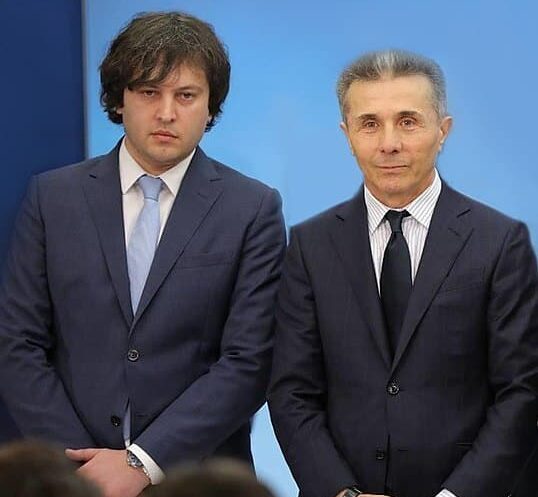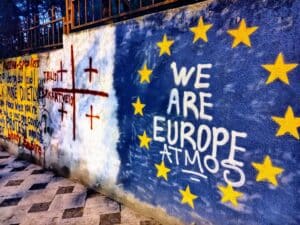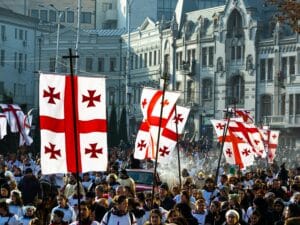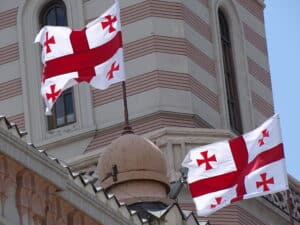Photo: Irakli Kobakhidze (GD chair) and Bidzina Ivanishvili – Wikimedia Commons
Last December, Georgia was granted EU candidate status by the European Council. Thousands of Georgians celebrated the historic decision. However, a lot of progress is still to be made. One of the key criteria set by the EU is ‘de-oligarchisation of politics’. This agenda item has been greatly complicated by the decision of Georgia’s largest oligarch – Bidzina Ivanishvili – to return to politics. While public opinion is predominately pro-Western, a return of Ivanishvili and his ideology might put EU-integration further on the line.
Bidzina Ivanishvili
Three-quarters of Georgians are pro-Western and foresee a European future. The government however, says that integration with Western institutions is the ultimate goal while its behaviour and policies have been questionable to say the least, avoiding necessary reforms. This raises the question if the ruling parties really want to join the EU. Georgia’s West-Russia dilemma has been part of society for a long time. Not least a result of people like billionaire Ivanishvili, who has been Prime Minister from late 2012 to late 2013 and has secured huge political influence since. Ivanishvili has created its wealth in Russia during the 90’s, as a result of which many believe he has had strong ties with the Kremlin ever since. When he was elected as PM, he promised to “normalise” relations with Moscow. He founded and largely controls the ruling Georgian Dream party, and he is known to pull strings behind the scenes and influence the country’s direction. Although Ivanishvili has stated that he will not run for Prime Minister again, his formal return to the political playing field is significant for Georgian politics in the run up to decisive parliamentary elections later this year.
Polarised landscape
Since its rise to power in 2012, GD has increasingly become an opportunistic power-seeking party. Real ideology is missing and the ruling party lives on nationalist sentiments and discrediting civil society, marking them as foreign influence with draconic laws. The country is moving in the direction of democratic backsliding and GD politicians have expressed admiration for illiberal, conservative leaders as Orbán and Xi Jinping, even signing a partnership agreement with the latter. By its multi-vector policy, GD has dominated Georgian politics and impedes political success of the opposition. One of the reasons Ivanishvili announced his return is this weak opposition. He fears that too much power for GD with no opposing force, will create internal tensions. He is aware that some kind of opposition is needed to receive legitimacy as well. Portraying this as the reason for Ivanishvili to ‘return’ is a sophisticated frame by GD. It is GD that is responsible for this weak opposition and the idea that Ivanishvili is returning is a flaw. He has never really left politics and always pulled strings in the background. There is not much difference now in the internal politics of GD and its relation with the opposition.
The importance of deoligarchisation
One of the key priorities for Georgia set out by the EU to reform, is deoligarchisation. The draft law on deoligarchisation proposed by Georgia was rejected by the Council of Europe’s Venice Commission last June. The law would be too much focused on persons rather than a systemic approach, which would open the potential for “political abuse and arbitrary application”. In November, Georgia released a Deoligarchisation Action Plan which was received much better. The importance of deoligarchisation is undisputable as the Georgian political culture is characterised by high financial barriers. The cost of campaigning, media representation and other forms of communication are notoriously high in the country. This causes parties that are run by wealthy donors to have an unfair advantage on the political scene, blurring commercial and political interests more often than not.
The ‘return’
Ivanishvili has framed his ‘return’ as doing good to the integrity of the party and Georgian politics. However, the real reason is more likely to safe its own skin, by going into the public again. Rumour has it that Ivanishvili might run to become president this year. In that role it would become harder to be sanctioned by Western countries.It is a kind of fallacy that formally returning to politics is part of deoligarchisation, while in essence nothing really changes. A quarrel following a statement by the Danish Ambassador calling Ivanishvili an oligarch, is a warning which shows that GD is not pleased with any comment on what they see as internal political developments.
Elections
The parliamentary elections this autumn can be a turning point in Georgia’s political history, especially concerning its foreign matters. Its relation with Russia and peace and stability in the South Caucasus region more broadly are at stake. GD’s diminishing popularity could initiate an end to one-party dominance and demand a coalition. The granted candidate status has re-emphasised the diminishing role of Russia in the region and now is the time to fully commit to a European future, to stay firmly on the path of its Euro-Atlantic future.
The European Union, and especially the Commission, should make clear that for further EU alignment it is key to erase oligarchic, commercially vested elements from Georgia’s politics. The return of Ivanishvili provides the Georgian people therefore with a clear choice. Moreover, the Commission should should prevent that obtaining EU candidacy is trumped by GD as their accomplishment. Georgia ought to act on the new possibilities of enlargement and fulfil the European prospect that has been boiling since its independence.
Written by Timon Driessen



